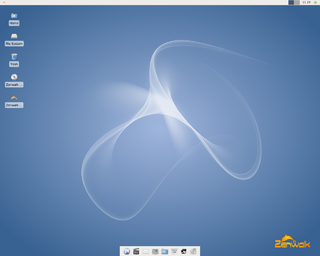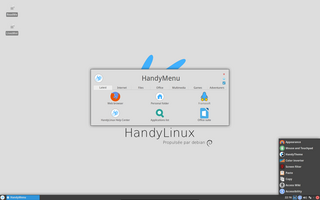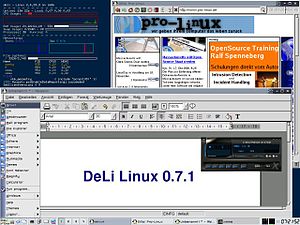
The Common Desktop Environment (CDE) is a desktop environment for Unix and OpenVMS, based on the Motif widget toolkit. It was part of the UNIX 98 Workstation Product Standard, and was for a long time the "classic" Unix desktop associated with commercial Unix workstations.

A Linux distribution is an operating system made from a software collection that is based upon the Linux kernel and, often, a package management system. Linux users usually obtain their operating system by downloading one of the Linux distributions, which are available for a wide variety of systems ranging from embedded devices and personal computers to powerful supercomputers.

A light-weight Linux distribution is a Linux distribution that has lower memory and/or processor-speed requirements than a more "feature-rich" Linux distribution. The lower demands on hardware ideally result in a more responsive machine, and/or allow devices with fewer system resources to be used productively. The lower memory and/or processor-speed requirements are achieved by avoiding software bloat, i.e. by leaving out features that are perceived to have little or no practical use or advantage, or for which there is no or low demand.

Puppy Linux is an operating system and family of light-weight Linux distributions that focus on ease of use and minimal memory footprint. The entire system can be run from random-access memory with current versions generally taking up about 600 MB (64-bit), 300 MB (32-bit), allowing the boot medium to be removed after the operating system has started. Applications such as AbiWord, Gnumeric and MPlayer are included, along with a choice of lightweight web browsers and a utility for downloading other packages. The distribution was originally developed by Barry Kauler and other members of the community, until Kauler retired in 2013. The tool Woof can build a Puppy Linux distribution from the binary packages of other Linux distributions.
Technical variations of Linux distributions include support for different hardware devices and systems or software package configurations. Organisational differences may be motivated by historical reasons. Other criteria include security, including how quickly security upgrades are available; ease of package management; and number of packages available.

Zenwalk is a Desktop focused Linux distribution founded by Jean-Philippe Guillemin. It is based on Slackware with very few modifications at system level making it 100% compatible with it. Zenwalk aims to be a modern and multi-purpose Linux distribution by focusing on Internet applications, multimedia and programming tools. Additionally, Zenwalk comes with many specialized tools, designed for beginner through advanced users as it offers system configuration via both graphical and command-line operations.

Frugalware Linux is a general-purpose Linux distribution designed for intermediate users who are familiar with command-line operations. Early versions were based on Slackware, but it is now an independently developed distribution. Frugalware uses the Pacman package management system from Arch Linux.

Linux is a family of open-source Unix-like operating systems based on the Linux kernel, an operating system kernel first released on September 17, 1991, by Linus Torvalds. Linux is typically packaged in a Linux distribution.
SUSE Linux is a computer operating system developed by SUSE. It is built on top of the free and open source Linux kernel and is distributed with system and application software from other open source projects. SUSE Linux is of German origin, its name being an acronym of “Software und System-Entwicklung”, and it was mainly developed in Europe. The first version appeared in early 1994, making SUSE one of the oldest existing commercial distributions. It is known for its YaST configuration tool.
GNU variants are operating systems based upon the GNU operating system. According to the GNU project and others, these also include most operating systems using the Linux kernel and a few others using BSD-based kernels.

Lubuntu is a lightweight Linux distribution based on Ubuntu, using the LXQt desktop environment in place of Ubuntu's GNOME desktop. Lubuntu was originally touted as being "lighter, less resource hungry and more energy-efficient", but now aims to be "a functional yet modular distribution focused on getting out of the way and letting users use their computer".

Kongoni is a Linux distribution that used the free version of the Linux kernel as distributed by the Linux-libre project. Development of the Kongoni project is currently dormant.

Hanthana Linux is a computer operating system based on the Fedora distribution, distributed as free and open source software. Hanthana Linux is among the active Fedora remixes.

MATE is a desktop environment composed of free and open-source software that runs on Linux and BSD operating systems. An Argentine user of Arch Linux started the MATE project to fork and continue GNOME 2 in response to the negative reception of GNOME 3, which had replaced its traditional taskbar with GNOME Shell. MATE aims to maintain and continue the latest GNOME 2 code base, frameworks, and core applications.

Manjaro is a free and open-source Linux distribution based on the Arch Linux operating system. Manjaro has a focus on user friendliness and accessibility, and the system itself is designed to work fully "straight out of the box" with its variety of pre-installed software. It features a rolling release update model and uses Pacman as its package manager.

HandyLinux is a Linux distribution originating in France and derived from the Debian stable branch. It is designed especially with inexperienced computer users in mind. The distribution has low system requirements, allowing it to be used on a range of older hardware that is no longer supported by the latest versions of proprietary operating systems. It is aimed particularly at older people with dated hardware who do not need or possess the skill to use many features afforded by state-of-the-art operating systems. It may also be useful for computer users with disabilities, such as visual impairment.













